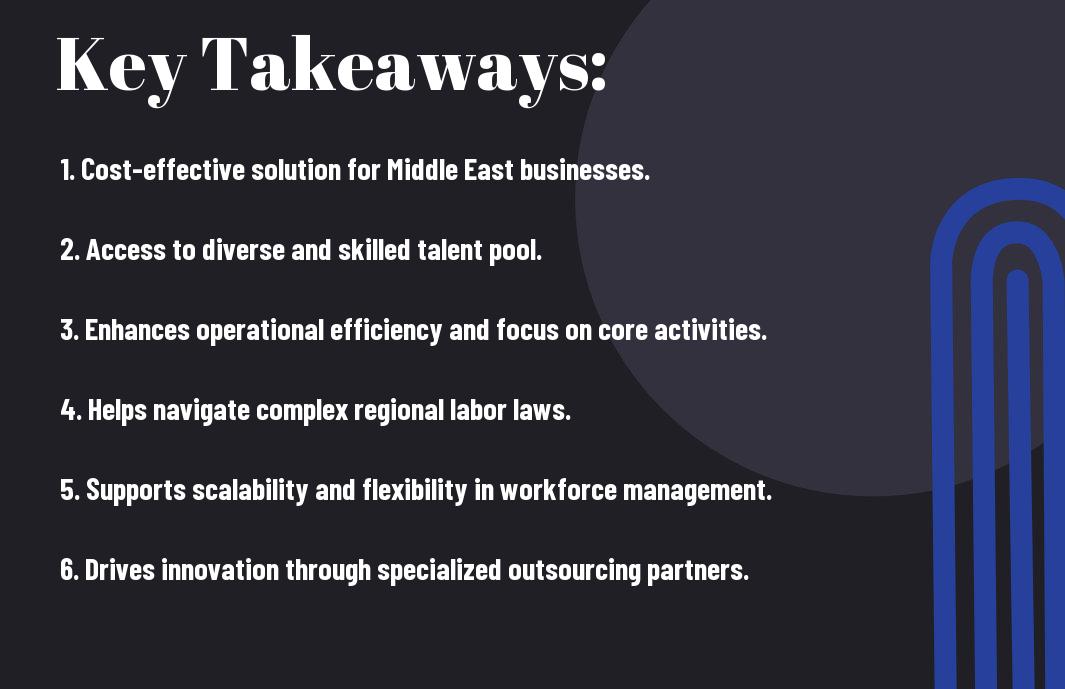You may be considering the benefits of employment outsourcing in the Middle East to enhance your business’s efficiency and reduce operational costs. This region has seen rapid growth in outsourcing services, offering a diverse talent pool and favorable economic conditions. By understanding the landscape of Middle East employment outsourcing, you can make informed decisions that can help your organization stay competitive and foster innovation. This blog post will guide you through the key aspects you need to know about outsourcing in the Middle East and how to leverage it for your business success.
Overview of Employment Outsourcing in the Middle East
For businesses considering expansion or operational efficiency in the Middle East, employment outsourcing has emerged as a strategic approach to streamline processes and manage costs effectively. This region, with its vibrant economy and diverse industries, offers numerous opportunities for companies seeking skilled labor without the need for direct employment. Outsourcing not only provides you access to a broader talent pool but also enables you to optimize your operations, whether in administrative functions, customer service, or technical roles.
As the Middle East continues to evolve, many companies are now rethinking their workforce strategies and adopting outsourcing solutions. This trend is further encouraged by advancements in technology and communications, which allow for remote management and supervision, making it easier than ever to collaborate with outsourced teams across borders.
Definition and Scope
Behind the concept of employment outsourcing lies the practice of delegating specific business functions or processes to external service providers. This arrangement can range from hiring an entire team for a project to contracting specialists for individual tasks. You should be aware that employment outsourcing in this context not only encompasses traditional roles but also includes digital and technical services, which have become increasingly vital in today’s competitive market.
The scope of employment outsourcing in the Middle East varies widely, touching industries such as IT, healthcare, finance, and manufacturing. By understanding the vast landscape of available outsourcing options, you can effectively tailor your strategic approach to fit your unique business needs and leverage the strengths of external providers.
Historical Context
Against the backdrop of globalization and shifting economic paradigms, employment outsourcing in the Middle East has witnessed significant evolution. Initially focused on labor-intensive industries, outsourcing strategies have developed to include skilled professional services, which are now a standard part of many organizations’ operations. This shift mirrors growth in local economies and the desire for efficiency, allowing companies to remain competitive on a global scale.
Historical trends indicate that key industries in the Middle East have embraced outsourcing with increasing enthusiasm over the past two decades. As global firms began to recognize the region’s potential due to its rich talent pool and evolving regulatory landscape, your business could find opportunities to benefit from this growth. Initially restricted to sectors such as oil and gas, the practice has expanded to encompass technology, research and development, and customer support, demonstrating the adaptability and resilience of the outsourcing model in meeting the demands of changing markets.
Key Industries Utilizing Outsourcing
If you are exploring the Middle East’s employment outsourcing landscape, one major aspect to consider is the key industries that leverage this model to optimize their operations. With the region’s diverse economy, various sectors have recognized the advantages of outsourcing to enhance efficiency, reduce costs, and access specialized skills. Companies in technology and IT services, alongside those in the oil and gas sector, have particularly benefited from these outsourcing strategies, allowing them to focus on their core competencies while relying on partner organizations for critical support functions.
Technology and IT Services
Below the surface of the fast-evolving technology sector in the Middle East, outsourcing plays an vital role in driving innovation and service delivery. As companies in this sector grapple with rising demands for software development, data analysis, and cybersecurity, many find that partnering with specialized firms helps them to meet their objectives more swiftly and effectively. By outsourcing certain IT functions, you can gain access to the latest technologies and expertise without the overhead of maintaining a larger in-house team.
Oil and Gas Sector
Above and beyond its economic significance, the Middle East’s oil and gas sector heavily relies on outsourcing to manage complex operations and projects. Companies in this industry often turn to outsourcing for various functions, including engineering services, maintenance, and even environmental management. This strategy allows you to optimize performance and streamline operations while effectively complying with industry regulations and standards.
Considering the oil and gas sector’s scale and complexity, outsourcing becomes a strategic option for maintaining competitiveness and innovation. With the region home to some of the world’s largest oil reserves, outsourcing not only helps you reduce costs but also enables you to tap into global best practices and technological advancements. This can transform how projects are managed, from exploration through to production and environmental stewardship, thus ensuring that your operations remain robust and efficient in a rapidly changing marketplace.
Benefits of Employment Outsourcing
While navigating the complexities of workforce management, you may discover numerous benefits that come with employment outsourcing. This strategic move can enhance your operational efficiency, allowing you to focus on your core business activities while delegating non-vital functions to specialized providers. In a region as dynamic as the Middle East, where talent demands can fluctuate rapidly, outsourcing can be a pivotal solution to stay agile in the ever-changing market landscape.
Cost Reduction
An vital advantage of employment outsourcing is the potential for significant cost reduction. By partnering with external firms, you can lower overhead expenses associated with hiring, training, and maintaining a full-time staff. For many organizations in the Middle East, this translates to decreased payroll taxes, benefits costs, and facilities management fees, enabling you to allocate resources more strategically to projects that matter most to your growth and success.
Access to Global Talent
Outsourcing opens the doors to a vast pool of global talent, allowing you to tap into expertise that may not be available locally. By choosing the right outsourcing partner, you gain access to specialized skills and knowledge that can enhance your team’s capabilities and lead to innovative solutions tailored to your business needs. This not only helps in meeting specific project demands but also fosters a diverse workplace culture that can drive creativity and adaptability.
Plus, leveraging global talent through outsourcing can be particularly advantageous in the Middle East, where you may face competition for highly skilled professionals. By broadening your recruitment horizons, you gain the ability to select from the best candidates worldwide. This access not only ensures that you have the right skills at your disposal but also enhances your company’s reputation as a forward-thinking organization committed to excellence and growth.
Challenges and Risks
Not every venture into employment outsourcing in the Middle East is devoid of challenges and risks. Economic and political factors can significantly impact your outsourcing strategy, requiring you to remain vigilant and adaptable. Geopolitical tensions, fluctuations in local economies, and various legal frameworks across the region can directly affect your operations. For example, countries may face sudden regulatory changes or economic downturns that could impact service delivery. You should also consider the financial implications of currency variability and its potential impact on your bottom line.
Economic and Political Factors
Above all, understanding the economic landscape and political climate is paramount for your success. Be aware of:
- Regional stability and political relations
- Economic growth rates and job market dynamics
- Employment laws and regulations
- Currency fluctuations and inflation rates
Thou must equip yourself with insights and data to navigate these unpredictable waters effectively.
Cultural and Communication Barriers
To successfully operate in a culturally diverse environment, being cognizant of cultural and communication barriers is imperative. Each country within the Middle East boasts its own unique set of customs, practices, and communication styles, which can lead to misunderstandings if not properly addressed. You may encounter various nuances in business etiquette, social norms, and even language that can affect collaboration and productivity. Thus, having a framework in place that promotes cultural sensitivity can go a long way in ensuring smooth interactions.
With their unique perspectives and values, individuals from the Middle East offer a wealth of talent but also come with a set of expectations and work habits that may differ from what you are accustomed to. Effective strategies such as comprehensive onboarding, cultural training for your team, and open lines of communication can significantly enhance your operations. Embracing these differences and building rapport can lead to a more cooperative atmosphere conducive to achieving your business objectives.

Legal and Regulatory Considerations
Keep in mind that the Middle East presents a unique landscape of legal and regulatory frameworks regarding employment outsourcing. As you navigate this terrain, it is crucial to familiarize yourself with the labor laws specific to each jurisdiction you are considering for outsourcing. Laws regarding worker rights, minimum wage requirements, working hours, and termination policies can vary significantly from one country to another. Always ensure that your outsourcing practices align with local regulations to avoid potential legal pitfalls that may arise from non-compliance.
Labor Laws and Compliance
After establishing your business presence in the Middle East, you must prioritize your understanding of labor laws and compliance requirements pertinent to outsourcing employment. Most countries in the region have specific regulations governing foreign employees, including visa requirements, work permits, and compliance with local employment legislation. Failure to adhere to these regulations can lead to serious consequences, including fines or the revocation of business licenses. To maintain compliance, engage with local legal experts who can provide valuable insights into the labor laws relevant to your industry and operations.
Contractual Obligations
Around your outsourcing efforts, the creation of robust contractual obligations is crucial to protect your interests and ensure compliance with local laws. When drafting contracts with outsourcing providers, it is vital to clearly outline the terms of service, responsibilities, and rights of both parties. Ensure that these contracts address key aspects such as performance metrics, confidentiality agreements, and dispute resolution procedures. Prioritize clarity and specificity in the contract language to prevent misunderstandings that may arise during your partnership.
At the same time, be aware that contracts in the Middle East may also need to comply with local commercial laws and standards, which can differ from those you may be accustomed to in your home country. This includes understanding local interpretations of contract enforceability and the potential need for arbitration in conflict situations. Engaging with legal professionals who specialize in international contracts and have knowledge of the regional context will enable you to establish sound agreements and mitigate risks associated with outsourcing contracts.
Future Trends in Employment Outsourcing
After analyzing the current landscape of employment outsourcing in the Middle East, it becomes evident that several key trends are shaping its future. The rise of digital platforms and the increasing demand for remote workforce solutions are transforming the way businesses engage in outsourcing. As companies look to streamline costs and enhance operational efficiency, you will likely see a shift towards more flexible outsourcing models that facilitate access to a global talent pool.
Technological Advancements
To fully harness the benefits of employment outsourcing, it’s necessary to embrace the technological advancements that are driving this transformation. Innovations such as artificial intelligence, machine learning, and automation are reshaping how tasks are performed and managed. By leveraging these technologies, you can optimize recruitment processes and improve communication between your in-house teams and outsourced partners, thus creating a more cohesive working environment.
Evolving Workforce Dynamics
After reviewing the changes in workforce dynamics, it’s clear that the traditional employment model is evolving. You are likely to see a growing number of professionals seeking freelance or contract roles, driven by a desire for flexibility and work-life balance. This shift will challenge organizations to adapt their outsourcing strategies to attract and retain top talent, focusing on creating an attractive work culture that resonates with modern workers.
This evolution in workforce dynamics also emphasizes the importance of soft skills and cultural fit, as remote interactions become more commonplace. You should consider implementing strategies that enhance team collaboration and accommodate varying work styles, making it easier for you to engage a diverse range of talent. By recognizing these trends, you can position your organization to thrive in the ever-changing terrain of employment outsourcing in the Middle East.

Conclusion
Taking this into account, your understanding of Middle East employment outsourcing can significantly enhance your strategic decisions in today’s global job market. By recognizing the unique advantages offered by this region, such as cost efficiency, cultural alignment, and a skilled workforce, you position your business or career for success. Not only can you access a diverse pool of talents, but you can also benefit from the region’s emerging economic landscape and favorable business conditions. Evaluating your options critically will help you leverage these benefits effectively.
Furthermore, as you navigate the intricacies of outsourcing in the Middle East, it is imperative to conduct thorough research and foster relationships with local partners. This ensures you not only comply with regional regulations but also tap into deeper market insights. Ultimately, your proactive approach will be instrumental in maximizing the returns on your outsourcing investments, thus facilitating sustained growth and innovation in your endeavors.





